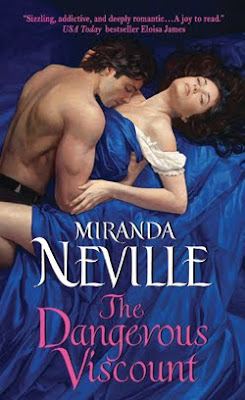 Today we welcome Miranda Neville as guest blogger with a copy of her latest release THE DANGEROUS VISCOUNT to offer as a prize. Your question or comment will enter you into the drawing and Miranda will drop in during the day to chat. And now, over to Miranda…
Today we welcome Miranda Neville as guest blogger with a copy of her latest release THE DANGEROUS VISCOUNT to offer as a prize. Your question or comment will enter you into the drawing and Miranda will drop in during the day to chat. And now, over to Miranda…
When I helped my father move out of my childhood home, he asked me to go through a box of family papers. Along with my grandfather’s World War I diaries, I discovered a curious volume listing family members and friends and their weights. Investigation revealed that for seventy years, beginning in 1850, there had been a weighing scale in the hall of the family house in Norfolk, England. After reeling with gratitude that the practice of weighing visitors had ceased long before my time, I decided I needed to put this piece of lunacy in a book.
THE DANGEROUS VISCOUNT is, among other things, a book about opposites attracting. Sebastian Iverley is a bookworm, a real Regency nerd and a misogynist to boot. Diana Fanshawe is a girly girl. She loves parties and fashion and worries about her weight. And she knows about her weight, even without the chart of Recommended Weights For Women (I hate that chart, but I digress), because her eccentric father has a scale in the hall and insists on weighing his friends and relations.
 I had to find out what the scale should look like. The St. James’s Street wine merchant, Berry Brothers & Rudd, still exists from the Regency. Gentlemen (including Byron) used their scale—shown here in a photo from their website–to weigh themselves, but it’s obviously a commercial machine. With a little research I figured out what kind of contraption Diana’s father might have owned.
I had to find out what the scale should look like. The St. James’s Street wine merchant, Berry Brothers & Rudd, still exists from the Regency. Gentlemen (including Byron) used their scale—shown here in a photo from their website–to weigh themselves, but it’s obviously a commercial machine. With a little research I figured out what kind of contraption Diana’s father might have owned.
 Then, in one of those bits of serendipity that occur in writing, I was researching a scene set in Gentleman Jackson’s Boxing Saloon. Beau Monde member Anke Fontaine produced an engraving which includes – a weighing machine! And it was pretty much as I had described it three hundred pages earlier.
Then, in one of those bits of serendipity that occur in writing, I was researching a scene set in Gentleman Jackson’s Boxing Saloon. Beau Monde member Anke Fontaine produced an engraving which includes – a weighing machine! And it was pretty much as I had described it three hundred pages earlier.
Unable to avoid her father, Diana submits to being weighed and there’s a witness to her humiliation. Luckily it isn’t Blakeney, the hunky ducal heir she has her eye on. It’s only Blake’s nerdy cousin Sebastian and who cares what he thinks?
“Up you get, my dear,” Mr. Montrose ordered. She looked around as though contemplating flight, then climbed into the swinging chair.
Watching her father conduct some business with blocks of metal hanging from a horizontal bar, Sebastian realized the device was a weighing machine.
“Eight stone, two pounds,” Mr. Montrose announced. “Let me see.” He picked up a vellum bound volume from a small table and flipped through the pages. “Five pounds more than last time.”
“I’m wearing a riding habit. This cloth is very heavy,” she said.
Her father wagged his finger at her then pointed at the entry in the ledger. “None of that. Last time you wore a winter gown and full-length fur-trimmed pelisse. See? You made me record it in the book.” He dipped a pen in an inkwell kept handy for the task and entered his daughter’s new weight.
Although not in the habit of judging people’s emotional reactions—men, thank God, didn’t have them—Sebastian noticed Lady Fanshawe looked as though she were about to cry. Was she, for some reason, upset about the increase in her weight? He couldn’t imagine why. He found her figure absolutely perfect. Its diminution by even an ounce would be a sad loss.
Though things like counting calories and the science of nutrition were in the future, people of the period did go on reducing diets. The most famous is probably Byron’s regime of vinegar and mashed potatoes. Diana wants to lose the extra inches from her bust so I invented a couple of diets for her, including one in which she eats nothing but dessert. (That one isn’t a great success).
Despite her appalling obesity (I’d pay good money to weigh only eight stone two [114 pounds]!) Sebastian falls for her. She is totally not interested (in addition to all his other disadvantages her mother likes him). Trying to impress the future duke, Diana bets Blake she can get Sebastian to kiss her and Sebastian is devastated when he finds out about the wager. With the help of his friends in the Burgundy Club, he gets a makeover, transforms himself into an eligible London bachelor, and plots to seduce her. Stuff happens, yadda yadda yadda, and they live happily ever after. If you want to know whether Diana loses the weight you’ll have to read the book.
What’s the oddest thing from your own life you’ve put into a book? And if you are sensible enough not to attempt the writing of fiction, help out a desperate author by sharing an experience I can turn into an utterly improbable scene in a novel. One commenter will win a copy of THE DANGEROUS VISCOUNT.














